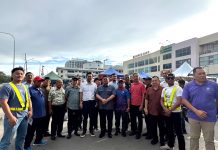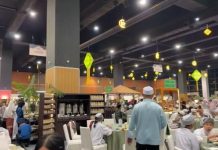KOTA KINABALU: The Malaysia My Second Home (MM2H) is a programme promoted by the Malaysia Tourism Authority and the Immigration Department of Malaysia, to allow foreigners to originally stay in Malaysia for a period of ten years.
In a statement Roger Chin the President of Sabah Law Society (SLS) stated that foreigners who fulfill certain criteria may apply, and a successful applicant is allowed to bring a spouse, an unmarried child under the age of 21, and parents who are over 60 years old.
Currently the Ministry of Tourism and Culture (MOTAC) is responsible for promoting MM2H, with approval of applicants and issuance of visas made directly by the Immigration Department of the Ministry of Home Affairs.
According to him, since the programme started in 2002, a total 40,000 applications have been approved. The country’s economy is stimulated with a cumulative gross value-added income of RM11.89 billion from 2002 to 2019 through visa fees, property purchases, personal vehicle purchases, fixed deposits, and monthly household expenditure.
The scheme, which was suspended for about a year, will be restarted in October 2021 with sweeping changes, including a significant hike to the income criteria, with visas now valid for only five, instead of 10 years, he stated.
“Under the new rules, foreigners must prove they have liquid assets worth RM1.5 million
(US$354,000) – up from RM350,000 for those above the age of 50, and RM500,000 for those below the age of 50 – although RM500,000 of the funds can be used for property, health care and school fees.”
“They must also have a monthly offshore income of at least RM40,000 (US$9,400) compared with RM10,000 previously, which the Malaysian government says ties in with its effort to target high-income individuals who can contribute to an economy hard-hit by the Covid-19 pandemic and political unrest.”
Although the changes may not have retrospective effect, imposition of the new conditions for renewal would effectively be putting existing MM2H holders at a disadvantage as the same principles against retrospective laws making the law less certain and reliable would also be applicable to them – a person who makes a decision based on what the law is, may be disadvantaged if the law is changed retrospectively. It is said to be unjust because it disappoints ‘justified expectations’.
In July 1963, the “Malaysia Agreement” was signed in London by the British and Malayan
Governments, Sarawak, Sabah and other parties (including Singapore) for the formation of Malaysia, and the agreement included the special interests and safeguards for Sabah and Sarawak which were recommended by the Inter-Governmental Committee, he further stated.
“The Malayan Parliament then made changes to the 1957 Constitution to make it a Federal
Constitution for Malaysia, and the special interests and safeguards for Sabah and Sarawak were included in the Constitution.”
“Amongst the special interests and safeguards for Sabah and Sarawak is the power for Sabah and Sarawak to control the entry and residence of non-Sabahans and non-Sarawakian into the two States.”
The Federal Constitution says that before any changes can be made to any of these special interests and safeguards, at least two thirds of the members of the Dewan Rakyat and Dewan Negara in Parliament must agree and the Yang Dipertua Negeri of both Sabah and Sarawak (who must follow the advice of the States’ Cabinet) must consent to it, he said.
“Sabah and Sarawak have further special interests, including Part VII of the Immigration Act 1959/1963, a special provision for the states of Sabah and Sarawak, which states that anyone who does not belong to Sabah and Sarawak must have a valid Permit or Pass to enter Sabah or Sarawak except for members of the Federal Government, judges, public servants or a person entering for the sole purpose of engaging in legitimate political activity.”
“Sabah and Sarawak have the power to control who can enter their borders to ensure that only people who can contribute positively to the growth of the State and are not deemed a threat to law and order are allowed to enter and reside in the States.”
“Accordingly, these special interests and safeguards allows Sarawak to have its own MM2H program under its Sarawak Tourism Board, that has different requirements and incentives from the one implemented in Peninsular Malaysia. Some of the differences applied by Sarawak are the requirement to invest in properties worth at least RM600,000 for residential purposes applies only to applicants who are between 40 and 50 years of age. Applicants aged above 30 could be considered if they were accompanying their children to study in Sarawak or seeking long-term medical treatment.”
In addition, a minimum stay period of 15 days cumulative per year is required and a 10-year pass will be issued to successful applicants, he stated, adding that such special interests and safeguards for Sabah and Sarawak Sabah also permits Sabah to have its own MM2H program with its own terms and conditions.
“The Sabah Maju Jaya (SMJ) development plan launched by Chief Minister Datuk Hajiji Noor outlines three main thrusts to develop the state from 2021 to 2025 – agriculture, industry and tourism; human capital and the well-being of the people; green infrastructure and sustainability networks.”
“Under the SMJ development plan, Sabah intends to attract and bring external investments into the State as foreign investment will boost the State development.”
Sabah’s very own MM2H program on its own terms and conditions can go a long way to attract foreign investment into the State, including those who may no longer qualify under the new rules set under the Peninsular Malaysia programme, Chin stated.
“As an example, in the United States the EB-5 visa, an employment-based fifth preference category or EB-5 Immigrant Investor Visa Program, created in 1990 by the Immigration Act of 1990, provides a method for eligible Immigrant Investors to become lawful residents—informally known as ‘green card’ holders—by investing substantial capital to finance a business in the United States that will employ at least 10 American workers. The EB-5 program is intended to encourage both foreign investments and economic growth.”
A shift in the Sabah state government’s focus of MM2H being primarily tourism driven to being investment driven could reap untold benefits for Sabah to encourage economic growth and prosperity propelled by foreign investments. Placement of the MM2H program under the purview of the Ministry of Industrial Development (MID) away from the Ministry of Tourism could be the catalyst to achieve this.
“The Sabah Law Society stands ready to assist the Sabah State Government, if required.”-pr/BNN






